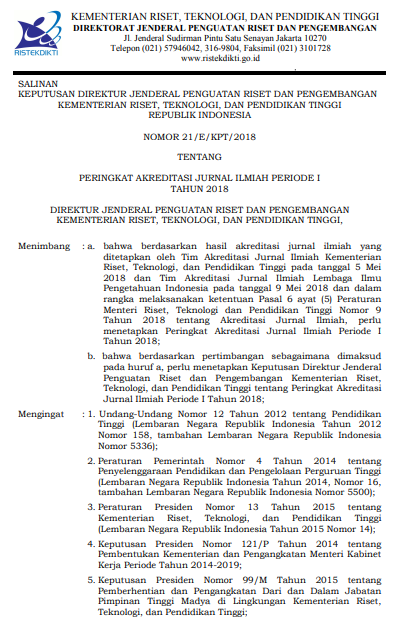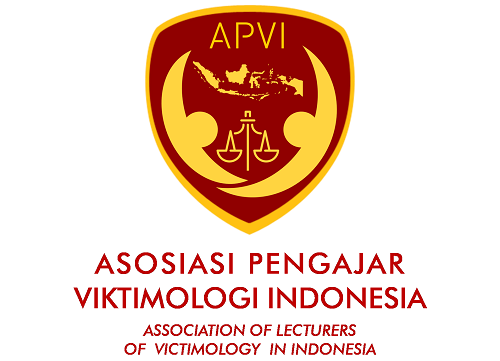Functionalization of E-Court System in Eradicating Judicial Corruption at The Level of Administrative Management
Abstract
This study aims to determine the effectiveness of the implementation of E-Court to eradicate the activities of judicial corruption. Corruption in the administration sector is closely related to the relationship between justice seekers and court administration staff. The problems raised in this study are how functionalization of E-Court in eradicating judicial corruption in administrative management of cases in the courts in JABODETABEK and how to reform the management of administrative court in the future. This study uses an empirical method approach with descriptive analytical research specifications. This is because this research seeks to illustrate the facts of the effectiveness of the e-court system in eradicating corruption in the court administrative management sector. This concept of public service must be well understood by the judiciary. The functionalization of e-court is considered not optimal since many justice seekers do not know the existence and usefulness of the system. It is expected that the e-court system will support the establishment of the principle of quick, simple and low cost justice in the administrative management of cases.
Keywords: E-Court, Court Administrative System, Corruption
Full Text:
PDF View
References
Baskoro, B. D. (2013). Perseteruan KPK dengan POLRI Dalam Upaya Pemberantasan Korupsi. Masalah-Masalah Hukum, 42(3), 336-345.
Butt, S., & Lindsey, T. (2010). Judicial mafia: The courts and state illegality in Indonesia. In The state and illegality in Indonesia (pp. 189-213).
Fatkhuri, F. (2018). Korupsi dalam Birokrasi dan Strategi Pencegahannya. Jurnal Ilmiah Manajemen Publik dan Kebijakan Sosial, 1(2), 65-76.
Ghufron, N. (2012). Kedudukan Saksi Dalam Menciptakan Peradilan Pidana Yang Bebas Korupsi. Jurnal Anti Korupsi, 2(2), 41-54.
Hamilton-Hart, N. (2001). Anti-corruption strategies in Indonesia. Bulletin of Indonesian Economic Studies, 37(1), 65-82.
Iqbal, M. (2018). IMPLEMENTASI EFEKTIFITAS ASAS OPORTUNITAS DI INDONESIA DENGAN LANDASAN KEPENTINGAN UMUM. Jurnal Surya Kencana Satu: Dinamika Masalah Hukum dan Keadilan, 9(1). 87-100.
Keyuan, Z. (2000, September). Judicial reform versus judicial corruption: Recent developments in China. In criminal law forum (Vol. 11, No. 3, pp. 323-351). Springer Netherlands.
Mochtar, K.2002. Konsep-Konsep Hukum dalam Pembangunan, Bandung, Alumni.
Nugroho, H. (2013). Efektivitas Fungsi Koordinasi dan Supervisi dalam Penyidikan Tindak Pidana Korupsi oleh Komisi Pemberantasan Korupsi. Jurnal Dinamika Hukum, 13(3), 392-401.
Raharjo, A., Angkasa, A., & Bintoro, R. W. (2015). Akses Keadilan Bagi Rakyat Miskin (Dilema dalam Pemberian Bantuan Hukum oleh Advokat). Mimbar Hukum-Fakultas Hukum Universitas Gadjah Mada, 27(3), 432-444.
Susanto, S. (2018). Kedudukan Hasil Audit Investigatif Pada Kekayaan Badan Usaha Milik Negara Persero Dalam Hukum Pembuktian Pidana di Indonesia. JURNAL CITA HUKUM, 6(1), 139-162.
Sudrajat, T. (2009). Perwujudan Good Governance Melalui Format Reformasi Birokrasi Publik Dalam Perspektif Hukum Administrasi Negara. Jurnal Dinamika Hukum, 9(2), 145-154.
Muhlizi, A. F. (2014). Revolusi Mental Untuk Membentuk Budaya Hukum Anti Korupsi. Jurnal Rechts Vinding: Media Pembinaan Hukum Nasional, 3(3), 453-472.
DOI: http://dx.doi.org/10.20884/1.jdh.2019.19.2.2510
Refbacks
- There are currently no refbacks.
JURNAL DINAMIKA HUKUM Indexed by :
 | Jurnal Dinamika Hukum | |
| Faculty of Law, Universitas Jenderal Soedirman | Copyright of Jurnal Dinamika Hukum | |
| Yustisia IV Building, Law Journal Center | ISSN 2407-6562 (Online) ISSN 1410-0797 (Print) | |
| Purwokerto, Central Java, Indonesia, 53122 | JDH is licensed under a Creative Commons Attribution 4.0 International License | |






